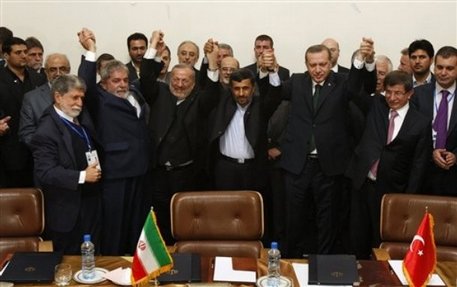A multi-polar world doesn't guarantee a less divisive one where everyone gets along and hugs out their problems. Quite the contrary.

Roger Cohen is frustrated by the Obama administration's reaction to the Turkish-Brazilian nuclear fuel deal with Iran:
Brazil and Turkey represent the emergent post-Western world. It will continue to emerge; Secretary of State Hillary Clinton should therefore be less trigger-happy in killing with faint praise the â??sincere effortsâ? of Brasilia and Ankara.The Westâ??s ability to impose solutions to global issues like Iranâ??s nuclear program has unraveled. America, engaged in two inconclusive wars in Muslim countries, cannot afford a third. The first decade of the 21st century has delineated the limits of U.S. power: It is great but no longer determinative.
Lots of Americans, including the Tea Party diehards busy baying at wolves, are angry about this. They will learn that facts are facts.
This strikes me as somewhat contradictory. Cohen laments the Obama administration's rejection of the fuel swap deal - which he concedes is an insufficient deal that fails to meet the Western demands put forth last year - because 1. You don't want to hurt feelings in Ankara and Brasilia, because they are emerging powers whom you might need down the road, and 2. this deal, while well short of the October arrangement, may have served as a "tenuous bridge between "mendacious" Iranians and â??bullyingâ? Americans."
First, the latter point: Spinning a deal for the sake of public perception and reaching a substantive deal are obviously two different things. Cohen asserts that this deal would've been a huge P.R. victory which, I suppose, it could have been. But if the administration is serious about nonproliferation it was necessary to knock this deal down right out the gate - which it apparently did.
And spin spins both ways. While Washington and the West certainly could have spun this deal to their advantage, so too could have the Iranians - as they already have. The whole point of this deal was not only to build trust between Tehran and Washington, but to assuage Western and regional concerns about Iranian enrichment. This week's trilateral deal fails to do that, and thus it fails to actually take time off the so-called Doomsday Clock.
In other words, accept this deal and you basically gave Iran seven months to set the terms of negotiation while rebuffing your own immediate concerns. Clenched fist, check.
As for Brazil and Turkey, what exactly was Obama to do? Accept the deal, and you accept the Turkish-Iranian argument that the deal represents the death knell of sanctions, which the U.S. never agreed to and never will. Cohen may view this deal as a beginning, but Tehran and Ankara are spinning it differently. And as Greg noted yesterday, China and Russia simply matter more than Brazil and Turkey do, especially on the matter of Iranian proliferation.
Will this hurt U.S. efforts down the road when, at some unforeseen moment, Washington needs Ankara or Brasilia? Perhaps. But that's the point: A multi-polar world doesn't guarantee a less divisive one where everyone gets along and hugs out their problems. Quite the contrary.
For much of the 20th century - and the first few years of the 21st - American power was rather easy: Either you're with us, or you're with the evildoer behind door #1. Make your choice. There was a kind of cold clarity in this arrangement, and in some ways the U.S. excelled at it. But as other powers emerge, they also come to the table with years - decades, even - of experience at playing a weaker hand inside global institutions like the UN. They know how to check the maneuverings and desires of other states, just as they too have been checked.
Washington isn't very good at this game, and it's going to take some time for the United States to rebuild capital and use its still preponderantly stronger military and economy to its advantage. This may require a more prudent, interests-based foreign policy designed to keep larger powers in your corner - which, in turn, will mean less peripheral meddling in said powers' backyards.
So will Ankara and Brasilia remember this? Probably. Welcome to the new world order.
UPDATE: Larison offers his thoughts on the matter.
(AP Photo)











